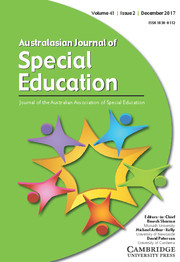Article contents
Using Evidence to Encourage Inclusive School Development: Possibilities and Challenges
Published online by Cambridge University Press: 26 February 2016
Extract
Recent research suggests that inquiry‐based approaches can be powerful in stimulating the development of inclusive practices. However, the implementation of such approaches can be difficult, particularly in contexts where there is a strong emphasis on improving standards, as measured by test and examination scores. This article describes and reflects on the authors’ experiences in working with staff in an English secondary school. It illustrates how the use of evidence, particularly the views of students themselves, can be a powerful lever for change. The paper argues that the successful use of such approaches will depend on forms of leadership that foster a willingness to address the challenges that emerge as a result of listening to the voices of different people.
- Type
- Research Article
- Information
- Copyright
- Copyright © The Australian Association of Special Education 2005
References
- 11
- Cited by


